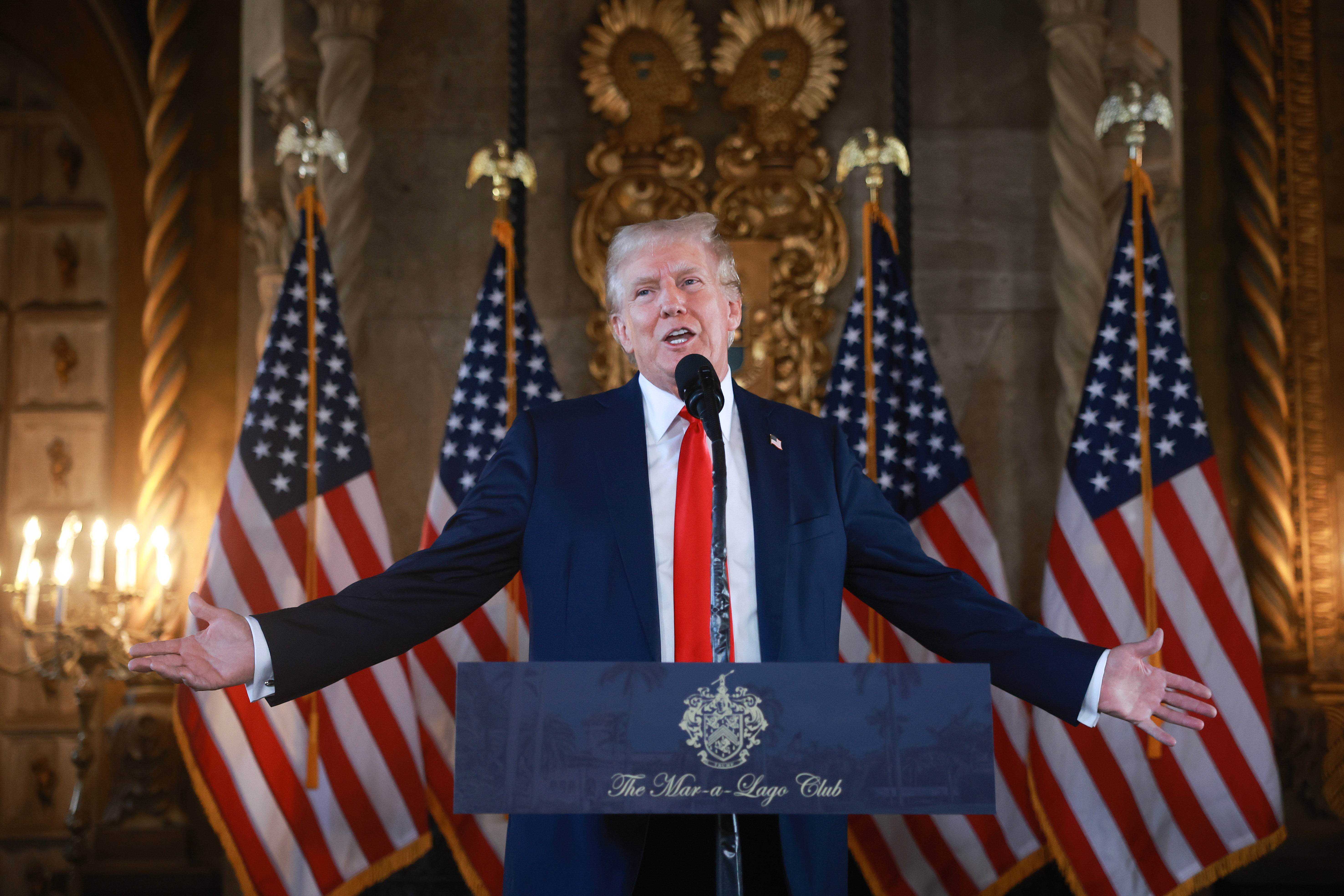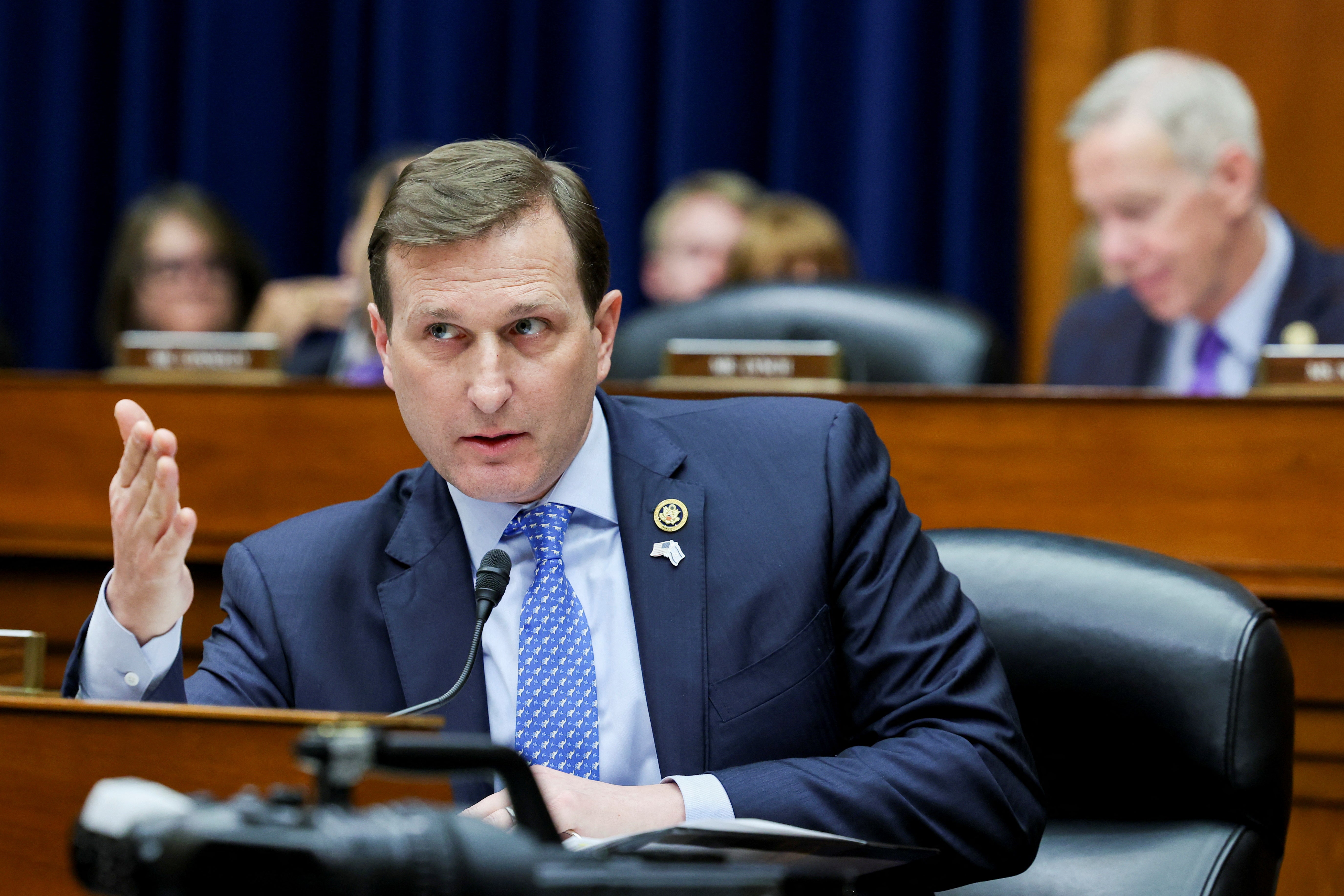Donald Trump is once again entertaining the prospect of serving an unconstitutional third term as president as he asked a crowd of supporters whether he should run again.
The president basked in chants of “four more years” just one month into his second term while at a White House reception celebrating Black History Month on Thursday.
Trump’s suggestion came just days after referring to himself as a “king” and quoting Napolean Bonaparte, unsubtly stating that he was above the law.
Those chants were echoed later Thursday by Trump’s former White House strategist Steve Bannon while on stage at the Conservative Political Action Conference, who said leaders like him come along once or twice in history.
“We want Trump in ‘28… We want Trump! We Want Trump!,” Bannon said before later gesturing, what critics say, a salute that resembled a Sieg Heil.
Since early in his 2024 campaigning, Trump repeatedly mused about a third term. He has raised the idea over and over again since his first term in office.
The 22nd Amendment of the Constitution says that presidents can only serve up to two full terms (eight years). Trump has said he may feel “entitled” to more while also suggesting he doesn’t want to run again after his next term ends in January 2029.
Congressional Democrats have proposed a measure to clarify that the 22nd Amendment expressly forbids a third term in office, and 78-year-old Trump, the oldest U.S. president in history, has at times admitted defeat to the constitutional guardrails he’s up against, despite his rhetoric.
What else has Trump said about a third term?

Just days after winning the 2024 election, Trump told House Republicans: “I suspect I won’t be running again unless you say ‘He’s so good, we got to figure something else out.’”
Last month, at the House Republicans’ annual retreat in Florida, he joked about whether he was allowed to run again. Days later at a Las Vegas rally, he pondered serving “not once, but twice… or three or four times.”
And at a prayer breakfast at the Washington Hilton on February 6, Trump mulled another four years, “despite the fact that they say I can’t run again.”
“You know, FDR 16 years — almost 16 years — he was four terms. I don’t know, are we going to be considered three-term? Or two-term?” he told a National Rifle Association convention in May last year, referencing Franklin Delano Roosevelt.
Elsewhere on the 2024 campaign trail, Trump suggested he would be a “dictator” and abuse power only on “day one” of his new administration, and told an audience of Christians if he got elected “you’re not going to have to vote” in the future.

It wasn’t just the most recent election cycle where Trump seemingly eyed a third term in office.
“We’re going to win four more years in the White House,” he said in 2022. “And then after that, we’ll negotiate, right? Because we’re probably — based on the way we were treated — we are probably entitled to another four after that.”
In 2018, he praised Chinese President Xi Jinping’s potential lifetime term in office as “great,” saying “maybe we’ll give that a shot someday.”
By 2020, while campaigning for reelection in Reno, Nevada, Trump told his followers that he was going to win the state and “win four more years in the White House,” before adding: “We’re probably – based on the way we were treated – we’re probably entitled to another four after that.”
When Trump was pressed on whether he believes he can serve a third term, the president said he doesn’t want one.
“I wouldn’t be in favor of it. I wouldn’t be in favor of a challenge [to the 22nd Amendment]. Not for me,” Trump told TIME in April last year. “I wouldn’t be in favor of it at all. I intend to serve four years and do a great job.”
Trump and his supporters often insist the Republican is joking or not being literal after he faces scrutiny for his statements, including after the Access Hollywood scandal, Trump’s call for Russia to release hacked emails from the Clinton campaign, and the president’s suggestion in his first term that disinfectant could be used as a treatment against Covid-19.
The debate around the 22nd Amendment aside, observers are alarmed that Trump adopted quasi-fascist rhetoric on the 2024 campaign trail, including claiming immigrants are ”destroying the blood of our country” and suggesting using the military to go after domestic critics, whom he dubbed the “enemy within.”
What is the 22nd Amendment?

The 32nd U.S. President Franklin D. Roosevelt’s four terms in office helped inspire the 22nd Amendment in the first place.
Ratified in 1951, the amendment came after Roosevelt had been elected four consecutive times, from 1932 to 1944. He died in office in April 1945, shortly into his fourth term.
The amendment states that presidents can serve a maximum of two full terms.
If a vice president becomes president during the term of their predecessor, which has occurred nine times in U.S. history due to death or resignation, they can still serve two full terms as long as they serve less than half of their predecessor’s remaining term.
Before Roosevelt, whose time in office coincided with the twin international crises of the Depression and the Second World War, presidents had observed an unofficial tradition of not serving more than two terms.
Despite Trump bucking constitutional guardrails in his first presidency, he would face a tall order in getting a constitutional amendment through Congress to try to secure a third term.
A proposal for a constitutional amendment requires a two-thirds majority in both the House of Representatives and the Senate, despite Republicans holding a slim majority in both chambers.
Ratifying an amendment would require three-fourths of all state legislatures.
How are Democrats responding?

Democrats are desperate for the Trump era to be over.
In November, New York Representative Dan Goldman introduced a resolution affirming that the 22nd Amendment would bar Trump from a third term.
He called on legislators from both parties to “stand by the oath we all took to support and defend the Constitution of the United States and confirm the Congress’ commitment to this principle.”
Goldman’s resolution would make clear that the 22nd Amendment “applies to two terms in the aggregate,” even if they are non-consecutive, like Trump’s.
Only one previous president, Grover Cleveland, has served two non-consecutive terms beginning in 1884 and 1892.
However, it is unlikely that Goldman’s resolution will make it to a vote in the Republican-dominated House.

